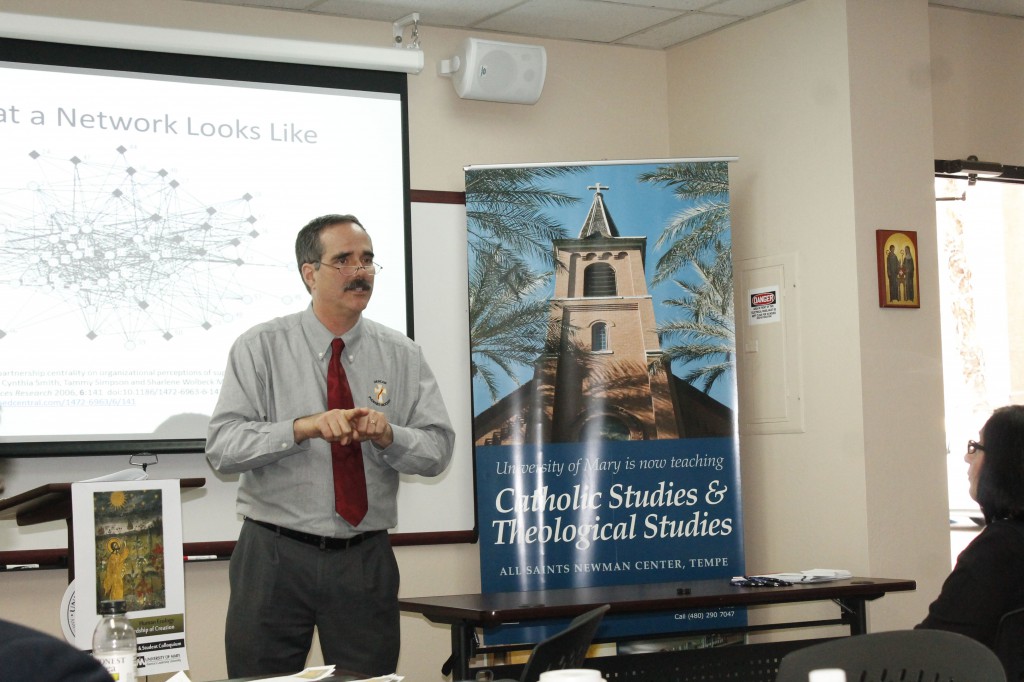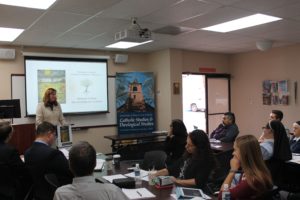
TEMPE — As Pope Francis prepares to issue an encyclical on man’s relationship to the environment, University of Mary-Tempe hosted a colloquium examining the topic.
From avoiding unnecessary waste to learning about ways to save the planet according to the Bible, the day was packed with plenty of practical information and food for thought.
The Nov. 21 gathering attracted clergy, University of Mary students, faculty and others to hear a panel of speakers address the various dimensions of human ecology.
Deacon Narciso Macia, an engineering professor at Arizona State University’s Polytechnic Campus, located on the former Williams Air Force Base, used contamination discovered at the site to illustrate a larger point. The base closed in 1993 and groundwater and soil contamination was found due to past disposal practices, spills and leaks.
“Do you think the mechanics who were working there at the time thought their actions would have such a big impact?” Macia asked the crowd rhetorically. “Probably not.” Our actions may seem inconsequential, Deacon Macia said, but over time, they add up.
Small sacrifices and conservation techniques to eliminate waste can help make a positive impact on our world, Deacon Macia said, citing the fact that Jesus himself, the same Man who could create something at the snap of His fingers, was concerned with waste, as is evident in the story of the multiplication of the fish and loaves.
He then drew an interesting conclusion from the parable. Deacon Macia reasoned that in the Bible, Jesus started with five loaves of bread and only two fish. When this ratio is compared with modern day dietary recommendations, it is nearly identical to the recommended intake of protein to carbohydrates and fiber. Our world simply cannot sustain every human eating meat twice a day, he said. A diet based mainly on plants and grains is not only beneficial for the environment, but also for our own health.
“It’s not that we shouldn’t eat meat,” Deacon Macia told The Catholic Sun. “It’s that over-consumption of meat is not good for us. Not only that, producing meat requires a lot more energy use than the production of grains.”
And if we’re too busy to donate our old computers to a thrift shop, they end up in a landfill, Deacon Macia said. Components from computers may contain harmful substances such as mercury, cadmium and lead.
The larger focus of the colloquium was to show God’s plan that calls on humanity to be steward, priest, and kin with all of His creation and how people can contribute to conserving the beauty that is God’s planet.
Maggie Otlewski, an ASU senior studying psychology who is also a Catholic studies major at University of Mary-Tempe said she thought the colloquium was informative.
“I really wanted to hear what the Catholic perspective on sustainability is since ASU puts such a focus on it,” Otlewski said.


Dr. Jo Markette, who oversees the theology and Catholic studies programs University of Mary, spoke about the negative impact on the environment caused by the millions of women who use birth control pills. The active ingredient in birth control pills has been shown to harm wildlife in waterways.
Dr. Leroy Huizenga, chairman of the theology department of the University of Mary in Bismark, N.D., spoke about the ecology of man in an age of technology.
“The Church has a responsibility toward creation and she must assert this responsibility in the public sphere,” Huizenga said. “In so doing, she must defend not only earth, water and air as gifts of creation that belong to everyone. She must above all protect mankind from self-destruction.”
— By Johnny Coronel, special to The Catholic Sun.






